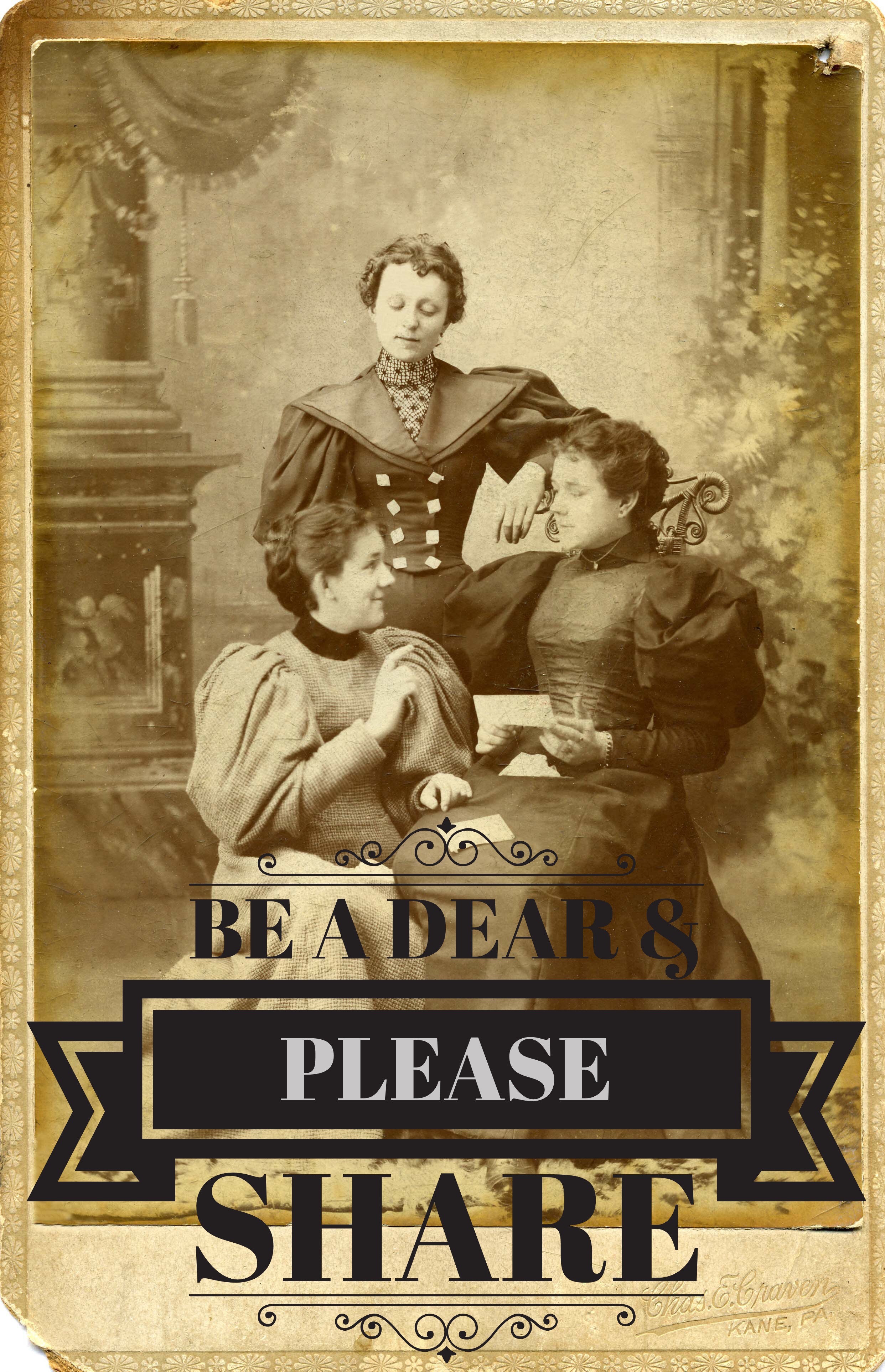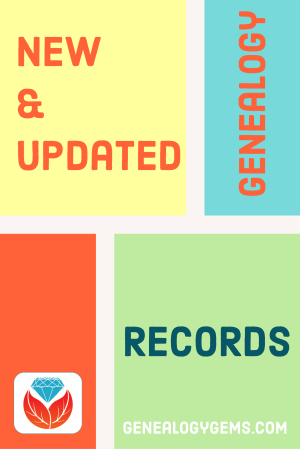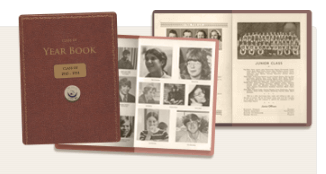New! North American Genealogy Records Online
New North American genealogy records online this week! Featured are U.S. military, passenger and yearbook records (including WWII film footage); regional collections for New England and Great Lakes; Congressional statutes; and over 63 million Mexican genealogy records now free at FamilySearch.org.
North American genealogy records
New online recently are North American genealogy records from all four “genealogy giants,” plus tons of other websites, including the Library of Congress and the U.S. National Archives. For those with Mexican roots, you’ll also love the enormous new cache of Mexican civil registration records online, all free to search from a central portal listed below.
U.S. military collections
World War II film footage. The U.S. National Archives has uploaded over 16 minutes’ worth of silent film footage identified as outtakes from the 1944 documentary, “Memphis Belle: A Story of a Flying Fortress.” The film images are from 1942 and 1943. The shot scenes include combat missions and tour scenes.
Veterans History Project adds Guadalcanal coverage. The Library of Congress blog recently announced, “The Library of Congress’ Veterans History Project (VHP) today launched its new “Experiencing War” website feature, titled “Guadalcanal: 75 Years Later,” recognizing the anniversary of the end of the major World War II campaign known as the Battle of Guadalcanal. The feature highlights 12 digitized collections found in the VHP archive, each of which includes the first-person narrative of a veteran who fought in this epic, six-month offensive in the South Pacific during 1942 and 1943.”
Military service rolls and records: Revolutionary War through Indian Wars. The always-free genealogy giant, FamilySearch.org, has added significantly to its resources about Revolutionary War soldiers:
- More than 220,000 indexed names have been added to United States Revolutionary War Rolls, 1775-1783, which include “Images of muster rolls, payrolls, strength returns, and other personnel, pay, and supply records of the American Army during the Revolutionary War.”
- The site has also added more than 600,000 indexed names to United States Rosters of Revolutionary War Soldiers and Sailors, 1775-1783. This collection includes “images of published state rosters of Revolutionary War soldiers from the states of Alabama, Connecticut, Massachusetts, New Jersey, Vermont, and Virginia.”
Genealogy giant and subscription website Ancestry.com has added a new database, “U.S. Army Indian Campaign Service Records Index, 1815-1858. According to the collection description, this database contains alphabetical card indexes to compiled service records of Volunteer soldiers who served 1836-1939 from units in Alabama, Georgia, North Carolina, Tennessee or the Volunteer Field and Staff of the Army of the Cherokee Nation. Also included are others who “served in various Indian wars or participated in the quelling or solving of Indian disturbances or problems, 1815-1858.”
More historical statutes online
The Library of Congress has posted new materials that will enable you to more easily research the laws relating to your ancestors’ lives. According to the site, “The individual statutes for congresses 68 through 81 are now available on the Law Library of Congress website. This addition closes the gap for the years for which the Statutes at Large were not available on the Internet. As with the volumes for previous congresses, each of these statutes is tagged with tailored, descriptive metadata to help users search and browse by facets.” Click here to explore these online collections for free.
U.S. passenger lists: Virgin Islands arrivals
FamilySearch.org has published a small but significant new collection of indexed records, United States, Virgin Islands Index to Passenger Arrivals, 1906-1947. According to the collection description, “This collection corresponds with NARA publications A3404 and A3407, both of which are passenger index lists. Publication roll A3404 serves as an index to the series “Passenger Lists of Vessels Arriving at Saint Thomas, U.S. Virgin Islands, July 16, 1907- May 12, 1923” NAID 2953525 and “Passenger Lists of Vessels Arriving at Saint Thomas, U.S. Virgin Islands, June 5, 1925 to-June 30, 1948” NAID 2953511. Publication roll A3407 consists of microfilmed index cards, which contain passenger list information for ships arriving at Honolulu 1900-1952 (ARC identifier 4493348).” Note that the title doesn’t reference Honolulu arrivals but the collection description does.
U.S. yearbooks
MyHeritage has published US Yearbooks, 1890-1979, a new collection claiming 36,207,173 digitized pages in 253,429 yearbooks, “one of the largest collections of digitized US yearbooks in existence,” states the collection description. “Yearbooks are excellent genealogical records that include personal portraits and group photographs. These books can give a researcher insight into students, faculty, and staff who attended or worked at a school. The yearbooks in this huge compendium are primarily from high schools, which in the United States normally comprise grades 9 to 12 or 10 to 12.”
New England
The New England Historic Genealogical Society has published new resources for those with New England heritage:
- “Thanks to our volunteers, we’re announcing three improved databases this week. These databases are now indexed by first name, last name, parents’ names, spouse’s name, location, date, and record type. They also now include images scanned from our manuscript collection. The improved databases are Guilford, CT Deaths, 1883-1890, Lincoln County, ME: Commissioners Marriages Records, 1759-1777, and Westfield, MA: Deaths in the First Church, 1728-1836.”
- “The Jewish Heritage Center at NEHGS is pleased to announce the launch of our new website, JewishHeritageCenter.org. This enhanced website will be another resource for patrons to explore the history of Boston and New England’s Jewish communities, and provide the Jewish Heritage Center at NEHGS the opportunity to further tell the stories of families, organizations, and synagogues. The website offers subject guides, links to featured exhibits and events, collection finding aids, and a variety of other resources for those with an interest in Jewish history and genealogy. Make sure to bookmark our website, and check back often for updated content!”
Great Lakes rail history
The Lake States Railway Historical Association is working to build an online archive and expand awareness of its important historical collections. According to this article in the Baraboo News Republic, “The collections at the Lake States Railway Historical Association contain countless stories of early railroads and the people who worked on them, and the organization’s leaders want to share them with the world. The 5,000-square-foot historical archive on Lynn Street in Baraboo is home to thousands of books, negatives, photographs, blueprints, drawings and other historical documents that detail early railroads, with a principal focus on the Western Great Lakes Region from 1880 to 1916. Volunteers are in the process of cataloging the collections in an online database so railroad enthusiasts around the globe can see what resources the organization has to offer.” Click here to explore their online catalog to their collection.
More Mexico civil registration records now online
FamilySearch.org has recently added over 63 million Mexico civil registration records! Among them are records from Aguascalientes, Baja California (and Sur), Campeche, Chiapas, Chihuahua, Coahuila, Colima, Distrito Federal, Durango, Guanajuato, Guerrero, Hidalgo, Jalisco, Mexico, Michoacan, Morelos, Nayarit, Nuevo Leon, Oaxaca, Puebla, Queretaro, Quintana Roo, San Luis Potosi, Sonora, Tamaulipas, Tlaxcala, Veracruz, Yucatan and Zacatecas. Search them all from the main search portal for Mexican genealogy.
Please share these North American genealogy records
We scour the internet every week looking for the best new collections you’ll want to see, then group them to help you better find the ones you need. These Friday record roundups are some of our most popular posts. Please help us get the word out about these new North American genealogy records online! Share this post on your favorite social media site or email it to your genie friends and society buddies. Thank you for sharing! You’re a gem!

About the Author: Sunny Morton
Sunny is a Contributing Editor at Lisa Louise Cooke’s Genealogy Gems; her voice is often heard on the Genealogy Gems Podcast and Premium Podcasts. She’s known for her expertise on the world’s biggest family history websites (she’s the author of Genealogy Giants: Comparing the 4 Major Websites); writing personal and family histories (she also wrote Story of My Life: A Workbook for Preserving Your Legacy); and sharing her favorite reads for the Genealogy Gems Book Club.
Disclosure: This article contains affiliate links and Genealogy Gems will be compensated if you make a purchase after clicking on these links (at no additional cost to you). Thank you for supporting Genealogy Gems!









